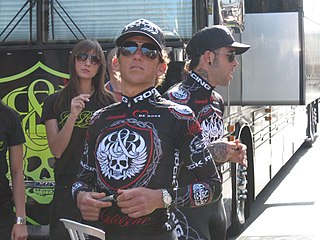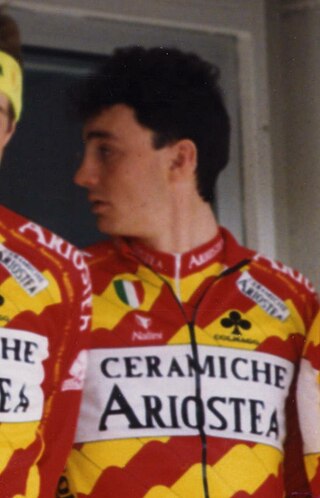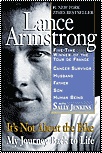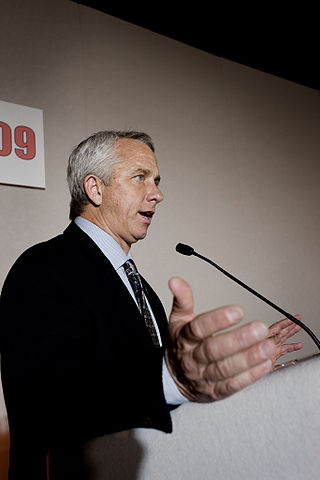
The Tour de France is an annual men's multiple-stage bicycle race held primarily in France. It is the oldest and most prestigious of the three Grand Tours, which include the Giro d'Italia and the Vuelta a España.

Gregory James LeMond is an American former road racing cyclist. LeMond won the Tour de France three times and the Road Race World Championship twice, becoming the only American male to win the former.

Jan Ullrich is a German former professional road bicycle racer. Ullrich won gold and silver medals in the 2000 Summer Olympics in Sydney. He won the 1999 Vuelta a España and the HEW Cyclassics in front of a home crowd in Hamburg in 1997. He had podium finishes in the hilly classic Clásica de San Sebastián. His victorious ride in the 1997 Tour de France led to a bicycle boom in Germany. He retired in February 2007.

The 2004 Tour de France was a multiple stage bicycle race held from 3 to 25 July, and the 91st edition of the Tour de France. It has no overall winner—although American cyclist Lance Armstrong originally won the event, the United States Anti-Doping Agency announced in August 2012 that they had disqualified Armstrong from all his results since 1998, including his seven Tour de France wins from 1999 to 2005; the Union Cycliste Internationale confirmed the result.

Tyler Hamilton is an American former professional road bicycle racer. He is the only American rider to win one of the five Monuments of cycling, taking Liège–Bastogne–Liège in 2003. Hamilton became a professional cyclist in 1995 with the US Postal Service cycling team. He was a teammate of Lance Armstrong during the 1999, 2000 and 2001 Tours de France, where Armstrong won the general classification. He was a key asset for Armstrong, being a very good climber as well as time-trialist. Hamilton appeared at the 2000 and 2004 Summer Olympics. In 2004, he won a gold medal at the individual time trial. The first doping test after his Olympic victory gave a positive result, but because the backup sample was frozen, no doping offence could be proven. After he failed further doping tests at the 2004 Vuelta a España, Hamilton was suspended for two years from the sport.

Fabio Casartelli was an Italian cyclist and an Olympic gold medalist. He was killed in a crash on the descent of the Col de Portet d'Aspet, France, during the 15th stage of the 1995 Tour de France.

Filippo Simeoni is an Italian former racing cyclist and the 2008 Italian road race champion. Simeoni won two stages in the Vuelta a España in 2001 and 2003, and the 2008 Italian National Road Race Championship.

The Critérium du Dauphiné, before 2010 known as the Critérium du Dauphiné Libéré, is an annual cycling road race in the Dauphiné region in the southeast of France. The race is run over eight days during the first half of June. It is part of the UCI World Tour calendar and counts as one of the foremost races in the lead-up to the Tour de France in July, along with the Tour de Suisse in the latter half of June.

Floyd Landis is an American former professional road racing cyclist. At the 2006 Tour de France, he would have been the third non-European winner in the event's history, but was disqualified after testing positive for performance-enhancing drugs. The competition was ultimately won by Óscar Pereiro.

Bob "Bobke" Roll is an American former professional cyclist, author, and television sports commentator. He was a member of the 7-Eleven team until 1990 and competed for the Motorola team in 1991. In 1992 Roll moved to Greg LeMond's Z team and added mountain biking to his racing accomplishments. Roll continued racing mountain bikes professionally through 1998. Roll is known in the cycling world, and to his global cable television fans, as "Bobke".

Philip Alexander Liggett is an English commentator and journalist who covers professional cycling.

Johan Bruyneel is a Belgian former professional road bicycle racer and a former directeur sportif for UCI ProTour team RadioShack–Nissan, and U.S. Postal Service, a US-based UCI ProTour cycling team. On 25 October 2018, the World Anti Doping Agency imposed a lifetime ban on Bruyneel for his role in a doping scandal that also saw Lance Armstrong stripped of his seven Tour de France titles.

There have been allegations of doping in the Tour de France since the race began in 1903. Early Tour riders consumed alcohol and used ether, among other substances, as a means of dulling the pain of competing in endurance cycling. Riders began using substances as a means of increasing performance rather than dulling the senses, and organizing bodies such as the Tour and the International Cycling Union (UCI), as well as government bodies, enacted policies to combat the practice.

It's Not About the Bike: My Journey Back to Life is a 2000 autobiographical book by American cyclist Lance Armstrong with Sally Jenkins.

LeMond Racing Cycles is a bicycle company founded by Greg LeMond, the only American winner of the Tour de France.
Sally Jenkins is an American sports columnist and feature writer for The Washington Post, and author. She was previously a senior writer for Sports Illustrated. She has won the AP Sports Columnist of the Year Award five times, received the National Press Foundation 2017 chairman citation, and was a finalist for the 2020 Pulitzer Prize. She is the author of a dozen books. Jenkins is noted for her writing on Pat Summitt, Joe Paterno, Lance Armstrong, and the United States Center for SafeSport.

Lance Edward Armstrong is an American former professional road racing cyclist. He achieved international fame for winning the Tour de France a record seven consecutive times from 1999 to 2005, but was stripped of his titles after an investigation into doping allegations, called the Lance Armstrong doping case, found that Armstrong used performance-enhancing drugs over his career. As a result, Armstrong is currently banned for life from all sanctioned bicycling events.

Greg LeMond competed at a time when performance enhancing drugs were just beginning to impact his sport. Rumors of improprieties existed, including USA Cycling's blood doping at the 1984 LA Olympics and Francesco Moser's same measures prior to his 1984 assault on the hour record, but legalities were not sharply demarcated and the practice was not spoken of in the open. Considered one of the most talented cyclists of his generation, from his earliest days of professional cycling LeMond was strongly against taking performance enhancing drugs, largely on the basis of the health risks such practices posed. His career lacks the suspicious results that have tarnished his successors. His willingness to speak out against doping and those prominent individuals involved inadvertently linked him with the sport’s doping scandal controversies. In his opposition to fraud, corruption and what he saw as complicity on the part of cycling officials, LeMond became a lightning rod with the sports most prominent personalities.

United States Anti-Doping Agency v. Lance Armstrong, the Lance Armstrong doping case, was a major doping investigation that led to retired American road racing cyclist Lance Armstrong being stripped of his seven consecutive Tour de France titles, along with one Olympic medal, and his eventual admission to using performance-enhancing drugs. The United States Anti-Doping Agency (USADA) portrayed Armstrong as the ringleader of what it called "the most sophisticated, professionalized and successful doping program that sport has ever seen."

Seven Deadly Sins: My Pursuit of Lance Armstrong is a sports book written by Sunday Times journalist David Walsh, which released on December 13, 2012. In the book, Walsh writes about his 13-year fight to bring out the truth behind American cyclist Lance Armstrong's seven Tour de France wins, i.e. that Armstrong had used banned substances. Walsh was vindicated when Armstrong was stripped of all seven of his Tour titles and banned from the sport for life on October 22, 2012. Armstrong's seven Tour wins are told to be his "seven deadly sins".



















